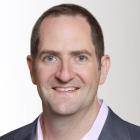Podcast: ThinkLive Commercialization 2021
By Matt Sarnes, PharmD
AmerisourceBergen recently hosted its first-ever manufacturer summit dedicated to commercialization strategy and market access. In this episode, hear highlights from the event. We listen in on a discussion among the leaders of our patient support, market access, and specialty GPO businesses and hear from executives on what motivates us to develop solutions with and for manufacturers.
Episode transcript
Doug Cook:
Patients motivate us. Innovators inspire us. We know your product matters. We understand the effort it takes to create. The hours in the lab, the money and mental energy you devote to a healthier tomorrow. Let us empower you. Together, let's deliver your specialty therapies to the markets and patients who need them most. Together, we will build partnerships to unlock product potential and move health forward. Welcome to ThinkLive Commercialization.
Jennifer Kemper:
Welcome to the AmerisourceBergen Insights Podcast. It’s been a little while, but we’re back to explore the issues that matter most to pharmaceutical manufacturers, healthcare providers, and anyone who shares our passion for moving health forward.
Today, we’re looking back at our ThinkLive Commercialization event. In February, we welcomed 189 attendees in brand management and patient access roles at more than 100 manufacturer partner companies to a virtual conference where we covered topics that span the full commercialization journey.
From day one, our executive and commercial leadership was clear about our purpose and commitment to help manufacturers bring life-changing medicines to market. At the top of the episode, you heard Doug Cook, President of Commercialization Services and Animal Health at AmerisourceBergen, welcome manufacturers to the event and re-emphasize our shared goals. Here’s Steve Collis, Chairman, President, and CEO reminding manufacturers why we can help them achieve their vision of commercial success:
Steve Collis:
Overall, AmerisourceBergen has the combination of proven solutions, diverse perspectives, and unmatched scale to get therapies to the smallest or largest patient populations. This unrivaled approach creates partnerships that unlock product potential and move healthcare forward. We are at a tremendous moment in our history, and I'm thrilled and optimistic about the future, especially for the valued customers and partners we serve.
Jennifer Kemper:
So how do we do it – partner with manufacturers to unlock product potential, that is? One critical piece of ensuring products reach their full potential is making sure patients can afford them – especially now.
Matt Sarnes and Tommy Bramley are experts from our market access/health economics and patient support businesses, respectively, and they participated in a panel discussion that featured our commercialization business leaders:
Matt Sarnes:
we know that your patients are struggling to afford their medications, right, as unemployment has continued to soar, and the average co-insurance for a specialty product is at about 26% of the cost of the product, which can really be financially devastating. So obviously, the financial assistance provided by patient support programs has been more important than ever. Many manufacturers have been coming to us to help them effectively gauge this changing demand on these programs to ensure that they have the right resources on hand to support these patients …
In addition to the greater services needed, the growing challenge in this space is the use of co-pay accumulators. In fact, we surveyed payers earlier this year and about 60% of them are using either co-pay accumulators or maximizers to restrict how co-pay assistance is applied. This again, can impact the patient out-of-pocket requirements and undo some of the benefit of patient support programs, thereby leading to non-adherence. Now, CMS, in the fall, recently released a final rule requiring drug manufacturers to ensure that the full benefit of their financial assistance reaches patients, or they face best price implications.
Tommy Bramley:
Yeah, you're exactly right, Matt, the co-pay accumulators continue to be a challenge for patients in accessing medication. And what we need to do is make sure we help patients access medication after the provider has prescribed it. It's our job to remove that complexity in accessing medications and simplify the path to better outcomes for patients while making it easier for providers. We're doing everything we can to accelerate and ease that process through enhanced benefit verification options, streamlined enrollments, and automating every step possible in the patient journey. Speed and high-tech are always balanced for us with an empathetic approach by our counselors and our ability to connect and problem solve when the most complex cases arrive. As healthcare becomes more technologically complicated, we need to be there for the patients to help them, and they're ready and waiting. The impact of the pandemic has shown that patients are open and willing to remote monitoring instead of in-office visits among other things.
Jennifer Kemper:
The conversation continued as Brian Ansay, who leads AmerisourceBergen’s oncology GPO, spoke to how specialty practices have adapted to the challenges presented by COVID-19.
Brian Ansay:
The pandemic has absolutely highlighted the vital role of community practices, how they've had to manage ongoing care delivery in this new paradigm and current pandemic, but we've really seen practices overcome tremendous odds. They've been able to activate, be flexible in order to serve their communities. And they've really found innovative ways to adjust their workflows while continuing that continuity of care. The creativity of these independent specialty practices has truly been inspiring to watch. We've seen practices set up labs and dispensing locations in their parking lots, implement telehealth services faster and more effectively than we thought were possible. Many of our practices were up and running within first week of the pandemic being launched. And they've been able to mobilize with great coordination and execution to take advantage of government programs, which were offered in the spring as part of the CARES Act.
This has really helped our practices keep their doors open and continue to treat patients. As far as challenges that we've been able to help with, early on in the pandemic, patient volume absolutely was their number one concern, as people were very hesitant to leave their homes and seek current care or even potential future care that was needed. And at that point, we started to initiate discussions with our pharmaceutical partners to help secure concessions on our GPO agreements, really to help ensure our practices would be able to continue to receive the product, but also be able to receive the value that they needed to maintain their overall practice viability. And as we look into the new year here in 2021, we'll continue to maintain those conversations with you all with the manufacturers and extend these revised terms as long as that's possible. And I know Matt has similar things that he's seen on his side of the business. Pass it over to Matt.
Matt Sarnes:
Yeah. Yeah. Thanks, Brian. You're right, we have seen similar things. So in oncology and for products in other disease areas, our field reimbursement and access programs have been essential, right? So like you mentioned, many providers were kind of struggling to understand what the pandemic was going to mean to them, and they had to successfully adopt tele-health to continue to deliver that care. Well, we had to do the same thing, right? Our field teams had to develop new technology solutions to make sure that they could be providing the services to not only patients, but to those providers as well, too, to ensure the stability of their practice. You know, the flexibility that we had to evolve essentially, our offering has been critical to the success of field services over the past year where what was traditionally a live visit became a phone visit. And they learned to do things on the fly virtually in very technology compliant methods.
And so we've completely evolved, and I don't think we'll ever go completely back to just that pure in-person visit. It will be a mix of virtual and live visits with virtual tools and some in-person hand-holding essentially, where it needs to be. I think we've really evolved to what the future of field services will be and make the services more efficient. The last point I'll make is we're also really working more tightly with the Lash Group and other hub vendors to get data almost real time, to make sure that we have the full picture of patient access for your product, to help ensure patients have access in a timely manner to those products. I don't know, Tommy, if you have anything else that you want to add there.
Tommy Bramley:
Yeah. Yeah. As you were talking about that match data by Xcenda and Lash Group working together, we can unlock the power of the combined hub and field teams to optimize patient outcomes. Working together, we are providing faster paths to treatment and we're using preferred communication modes, such as email, texts, and push notifications. We're providing consistent recommendations on process improvements as we gain those insights from the field teams. And through that, we have proven strategies to help reduce time to therapy. We're also innovating hub activities at the point of therapy. As the treatment decision is made by physicians, they can automatically enroll that patient into Lash Group hubs and they can complete prior authorizations digitally.
Jennifer Kemper:
This conversation was just one example of the collaboration happening between AmerisourceBergen businesses to make pharmaceutical-led care more accessible – and during just one moment in time. As two more days of ThinkLive Commercialization unfolded, attendees listened in on more discussions that demonstrated the combination of proven solutions, diverse perspectives and unmatched scale that only AmerisourceBergen can offer to unlock product potential and move health forward.
To hear full sessions on-demand, visit amerisourcebergen.com/insights. And remember, you can always visit us for resources and content on the issues that matter most to healthcare stakeholders.
The AmerisourceBergen Insights podcast is produced and delivered to you by AmerisourceBergen, a leading global healthcare company with solutions across the human and animal healthcare supply chain. The work of our 22,000 associates powers our purpose: We are united in our responsibility to create healthier futures. AmerisourceBergen is ranked #10 on the Fortune 500 with more than $175 billion in annual revenue.





